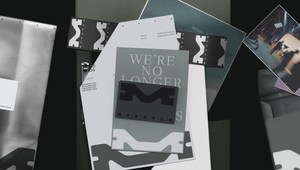
Bossing It: Why Effective Leadership Is Different for Everyone with Andrew Barnard

Andrew Barnard, or Barney as he’s known to most, met creative partner Will Thacker when on work experience at Inferno in 2005. In 2010 he moved to join newly-founded 18 Feet & Rising as account director where he spent eight and half years as a key member of the team. He left as managing director in 2019 and along with Will, who was by then ECD at 18F&R, opened the doors of 20(SOMETHING), with a renewed excitement for commercial creativity and how it could respond to the major agenda points of the coming decade.
LBB> What was your first experience of leadership?
Andrew> I probably became aware of good and bad leadership at school, mainly from teachers that could loosely be put into the same buckets. It struck me that empathy and respect were common traits amongst the teachers I responded to the best. That was probably down to a combination of them helping me find my way of doing things and in return, me not wanting to let them down. Since then, I've always believed in 'progress' and 'success' being conceived and measured at a very individual level.
As for my first experience of trying to lead, it's probably a case of the less said about that, the better. Effective leadership is different for everyone, it takes time to develop and hone, and it is forever a work in progress.
LBB> How did you figure out what kind of leader you wanted to be – or what kind of leader you didn’t want to be?
Andrew> I'm a big believer in stealing what you like in the people ahead of you and being very conscious of things you don't. Some of the most helpful things I have learned in my working life have been how not to do things, it's important to hold on to those learnings. It's important to forever be aware of those things so that we are constantly appraising what we shouldn't be doing as much are we're thinking about what we should be doing.
I've also always put a lot of value on seeking perspectives from outside of our industry. There are brilliant leaders in all walks of life, and they have to work in very different ways. Talking to people outside of advertising has always been extremely insightful, there are so many different approaches to leadership that can help you think outside of the ruts the industry gets itself into.
LBB> Did you know you always wanted to take on a leadership role? If so how did you work towards it and if not, when did you start realising that you had it in you?
Andrew> I was never driven to be a boss, per se, but as I gradually understood that I could achieve more with a bigger team, and help more people realise their own potential, it quickly became a focus for me. Ultimately, it's why we started our company. I wanted to recreate the best working conditions I'd experienced and help other people develop in the way I have been fortunate enough to do. It can be difficult to do that to the fullest, if you're not an ultimate decision maker.
LBB> When it comes to 'leadership' as a skill, how much do you think is a natural part of personality, how much can be taught and learned?
Andrew> The technicalities of leadership can be learned by anyone that has a desire to learn them, but that doesn't guarantee success. The style that one leads has more to do with effectiveness, and that is derived from personality. Even in autocratic systems, like the military, you find very different leadership styles amongst people of the same rank and discipline. That's because it's impossible to be an effective leader without your leadership reflecting your core values and beliefs. People respond to people, they don't respond to the job title, at least not in any meaningful way.
LBB> What are the aspects of leadership that you find most personally challenging? And how do you work through them?
Andrew> It's always difficult, despite your best efforts, when you struggle to reach a person. When that happens, we must go back to the school-teacher comparison and stare harder at what that person needs, what motivates them and then ask ourselves if we need to adapt our management approach. It can be helpful to take them out of the work environment and try to connect on a more personal level - it's worth remembering that people have a lot of shit going on in their lives, it's not always about their 9am - 5pm experience.
LBB> Have you ever felt like you've failed whilst in charge? How did you address the issue and what did you learn from it?
Andrew> Anyone who doesn't answer 'yes' to this question is a liar. It's impossible to succeed at anything without failures. I feel like I make mistakes almost on a daily basis but I continually remind myself that that's okay. It doesn't mean you are actually failing, necessarily, it just means that you are self-aware of your own development, have set the bar high and care about your role in other people's lives. Of course, when we do fail, we take the learnings out of it, right any wrongs and swiftly move onwards.
LBB> In terms of leadership and openness, what’s your approach there? Do you think it’s important to be as transparent as possible in the service of being authentic? Or is there a value in being careful and considered?
Andrew> Authenticity doesn't have to mean total disclosure of what's going on. For me, authenticity is much more about being true to the agreed values of our company, values that I have been involved with setting, along with everyone else I work alongside. As Managing Partner, I have a clear remit and set of responsibilities that I'm accountable to, just as everyone in the company does. What, how and when I choose to disclose the things that inform my decision making comes down to my judgement of what's appropriate to keep people invested.
There's a fine line between keeping people informed and keeping people in the dark, as there is between keeping them focused and risking them being distracted. We find our team responds well when they have an understanding of how the company is performing, and are comfortable with candour, because of the culture that we've built together.
LBB> As you developed your leadership skills did you have a mentor, if so who were/are they and what have you learned? And on the flip side, do you mentor any aspiring leaders and how do you approach that relationship?
Andrew> Some of the greatest privileges in my career have been to work into, and learn from, some brilliant industry practitioners. And there have been so many of them. Jonathan Trimble and Tim Doust stand out as people that have shaped my thinking at the highest level. Between them I have developed my values around creative work, craft, ambition and the importance of tribes and cultures in creative companies. Outside of the industry, I would cite a family friend - Sally Baker - as a person who has often helped me pull perspectives and tackle challenges in ways the ad industry sometimes struggles to understand. A seriously accomplished business woman, she has been in my life from before I can remember. She helped me pull together my first ever CV and when I think about it, I'm not sure I've written one since.
In return, I pay a huge debt of gratitude forward by trying to make time for younger people at the outset of their careers, as often as I can. I think it's important to pass that energy on to others. Not only are they our future, they can teach you so much about the changes constantly happening around you.
LBB> In continually changing market circumstances, how do you cope with the responsibility of leading a team through difficult waters?
Andrew> Basically, all of the above. Working with the team is where I get most of my energy from, my responsibility to support them drives my resilience. Without a capacity for resilience, everything else falls apart. In the more challenging times, I've peered over the edge; it's not a place I want to go.
LBB> How important is your company culture to the success of your business? And how have you managed to keep it alive with increases in remote and hybrid working patterns?
Andrew> We were only five or six months old when the pandemic properly hit, so our culture was forged via hybrid models. These days though, we wholeheartedly embrace it. We recognise the need for sociable working, quiet working, an increase in video calls and the need to let off some steam every now and then. We have an office space that's accessible around the clock, with certain days deemed autonomous working days. It gives people choices, a bit more control over their lives and a healthy sense of freedom but it also ensures we spend enough time together colliding face-to-face and crucially, learning from and supporting one another.
LBB> What are the most useful resources you’ve found to help you along your leadership journey?
Andrew> Trial and error are all part of the journey, but the others that have gone before you can help you find some short cuts. There are also myriad podcasts and books that can broaden one's horizons, spark ideas and offer up lessons that we'd perhaps rather not learn first hand. To anyone that's on the leadership journey I'd say, keep your head up and keep looking around you, take it all in. Keep your eye on the big picture but never lose touch with, or stop listening to, the team you aspire to lead. Effective leadership takes as much humility as it does courage of your conviction.















